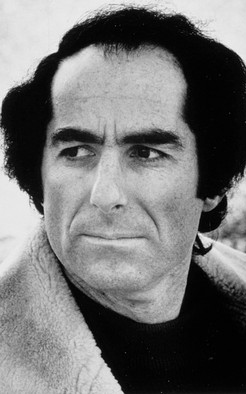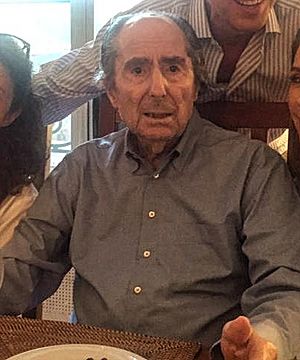Philip Roth facts for kids
Quick facts for kids
Philip Roth
|
|
|---|---|

Roth in 1973
|
|
| Born | Philip Milton Roth March 19, 1933 Newark, New Jersey, U.S. |
| Died | May 22, 2018 (aged 85) Manhattan, New York City, U.S. |
| Resting place | Bard College Cemetery |
| Occupation | Novelist |
| Education | Bucknell University (BA) University of Chicago (MA) |
| Period | 1959–2010 |
| Genre | Literary fiction |
| Spouse |
Margaret Martinson Williams
(m. 1959; div. 1963) |
| Partner | Claire Bloom (1976–1990) |
Philip Milton Roth (born March 19, 1933 – died May 22, 2018) was a famous American novelist from Newark, New Jersey. He wrote many books that explored American life and culture.
Roth became well-known in 1959 with his short story collection called Goodbye, Columbus. This book won a major award, the U.S. National Book Award for Fiction. Ten years later, he wrote a very popular book, Portnoy's Complaint. Many of his books feature a character named Nathan Zuckerman, who is like a fictional version of Roth himself. Sometimes, a fictional Philip Roth even tells the story, like in The Plot Against America, which imagines a different past for the U.S.
Philip Roth was one of the most celebrated American writers of his time. He won many important awards, including the Pulitzer Prize for his novel American Pastoral. In 2005, his complete works started to be published by the Library of America, which is a big honor. He passed away on May 22, 2018, at the age of 85, due to heart problems.
Contents
Early Life and School Days
Philip Roth was born in Newark, New Jersey, on March 19, 1933. He grew up in the Weequahic neighborhood. His parents, Bess and Herman Roth, were second-generation Americans from Jewish families. His grandparents came from parts of Eastern Europe.
Roth went to Weequahic High School in Newark and graduated around 1950. The school and its neighborhood often appeared in his books, especially in Portnoy's Complaint. His high school yearbook described him as a "boy of real intelligence, combined with wit and common sense." He was also known for being funny.
Becoming a College Student
After high school, Roth studied at Rutgers University for a year. Then, he moved to Bucknell University in Pennsylvania, where he earned a bachelor's degree in English. He was a very good student and was chosen for Phi Beta Kappa, an honor society.
He then went to the University of Chicago and earned a master's degree in English literature in 1955. For a short time, he taught writing there. He later taught creative writing at other universities, including Princeton University and the University of Pennsylvania. He stopped teaching in 1991 to focus fully on his writing.
Writing Career and Famous Books
Philip Roth's first writings appeared in the Chicago Review when he was a student. His first book, Goodbye, Columbus, came out in 1959 and won the National Book Award in 1960. His first full novel, Letting Go, was published in 1962.
In 1969, his book Portnoy's Complaint became very popular and made him widely known. During the 1970s, Roth tried different styles of writing. He later created his famous character, Nathan Zuckerman, who appeared in many of his novels between 1979 and 1986.
One of his interesting books is The Plot Against America (2004). In this story, Roth imagines a different American history. In this imagined world, Charles Lindbergh, a famous pilot, becomes U.S. President in 1940. He then makes a deal with Hitler's Nazi Germany.
Roth's novel Everyman (2006) explores themes of sickness, getting older, and death. This book won the PEN/Faulkner Award, making him the only writer to win it three times. His last Zuckerman novel, Exit Ghost, was released in 2007.
Roth often shared his thoughts about books and reading. He believed that books struggled to compete with screens like movies, TV, and computers. In 2012, he announced that he was retiring from writing fiction. He also said his appearance on BBC in 2014 would be his last on television.
What He Wrote About
Many of Roth's stories are set in his hometown of Newark, New Jersey. His books often felt very personal, blurring the line between real life and made-up stories.
While his books had personal touches, they also included comments on society and political humor. This was clear in books like Our Gang and Operation Shylock. From the 1990s onward, Roth's books often mixed his own experiences with fictional stories about American life after World War II.
His Personal Life
In 1956, while at the University of Chicago, Roth met Margaret Martinson. They married in 1959 but divorced in 1963. Margaret's death in a car crash in 1968 deeply affected Roth and inspired characters in some of his novels.
Roth was an atheist, meaning he did not believe in God. He once said he was "anti-religious" and found religious lies "hideous." He felt that writing was a lonely and sometimes scary process, but he never needed religion to help him through it.
In 1990, Roth married English actress Claire Bloom, whom he had lived with since 1976. They divorced in 1994.
His Later Years and Legacy
Philip Roth died in a Manhattan hospital on May 22, 2018, at the age of 85. He was buried at the Bard College Cemetery in New York. He had chosen this spot to be near his friend, the novelist Norman Manea. Roth did not want any religious ceremonies at his funeral.
Roth left his large book collection and more than $2 million to the Newark Public Library. In 2021, a detailed book about his life, Philip Roth: The Biography, was published.
Awards and Honors
Philip Roth won many awards for his writing. He received the National Book Award for Fiction twice and the National Book Critics Circle award twice. He also won the PEN/Faulkner Award three times and the Pulitzer Prize for American Pastoral.
In 2001, he received the first Franz Kafka Prize in Prague. In 2003, a famous literary critic, Harold Bloom, called Roth one of the four most important American novelists still writing.
In 2005, his hometown of Newark honored him by naming a street corner after him. This was the corner of Summit and Keer Avenues, where he lived as a child.
In 2011, President Barack Obama gave Roth the National Humanities Medal. That same year, Roth won the Man Booker International Prize for his lifetime achievements in fiction. This is a very important international award. While he won almost every other major award, he never received the Nobel Prize in Literature, even though many thought he deserved it.
Movies Based on His Books
Several of Philip Roth's novels and short stories have been made into films:
- Goodbye, Columbus
- Portnoy's Complaint
- The Human Stain
- The Dying Animal, which became Elegy
- The Humbling
- Indignation
- American Pastoral
His novel The Ghost Writer was also made into a television show in 1984. In 2020, HBO created a six-part TV series based on Roth’s The Plot Against America.
Selected Honors
- 1960 National Book Award for Goodbye, Columbus
- 1960 National Jewish Book Award for Goodbye, Columbus
- 1986 National Book Critics Circle Award (NBCCA) for The Counterlife
- 1991 National Book Critics Circle Award (NBCCA) for Patrimony
- 1994 PEN/Faulkner Award for Operation Shylock
- 1995 National Book Award for Sabbath's Theater
- 1998 Pulitzer Prize for American Pastoral
- 1998 National Medal of Arts
- 2001 Franz Kafka Prize
- 2001 PEN/Faulkner Award for The Human Stain
- 2001 Gold Medal In Fiction from The American Academy of Arts and Letters
- 2001 WH Smith Literary Award for The Human Stain
- 2002 Medal for Distinguished Contribution to American Letters
- 2005 Sidewise Award for Alternate History for The Plot Against America
- 2005 James Fenimore Cooper Prize for Best Historical Fiction for The Plot Against America
- 2006 PEN/Nabokov Award for lifetime achievement
- 2007 PEN/Faulkner Award for Everyman
- 2007 PEN/Saul Bellow Award for Achievement in American Fiction
- 2011 National Humanities Medal for 2010
- 2011 Man Booker International Prize
- 2012 Prince of Asturias Awards for literature
- 2013 Commander of the Legion of Honor by the Republic of France.
Honorary Degrees
Philip Roth received several honorary degrees from universities, recognizing his achievements:
| Location | Date | School | Degree |
|---|---|---|---|
| 1979 | Bucknell University | Doctorate | |
| 1985 | Bard College | Doctor of Letters (D.Litt.) | |
| May 20, 1987 | Columbia University | Doctor of Humane Letters (DHL) | |
| May 21, 1987 | Rutgers University | Doctor of Humane Letters (DHL) | |
| 2001 | Brown University | Doctor of Letters (D.Litt.) | |
| 2003 | University of Pennsylvania | Doctor of Humane Letters (DHL) | |
| June 5, 2003 | Harvard University | Doctor of Humane Letters (DHL) | |
| May 22, 2014 | Jewish Theological Seminary of America | Doctorate |
See also
 In Spanish: Philip Roth para niños
In Spanish: Philip Roth para niños
 | James B. Knighten |
 | Azellia White |
 | Willa Brown |


